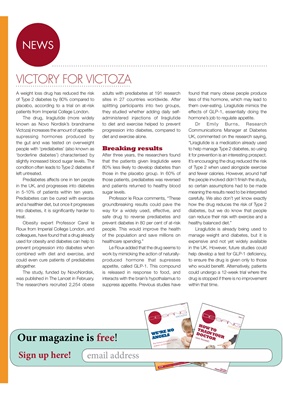
NEWS
VICTORY FOR VICTOZA
A weight loss drug has reduced the risk
of Type 2 diabetes by 80% compared to
placebo, according to a trial on at-risk
patients from Imperial College London.
The drug, liraglutide (more widely
known as Novo Nordisk's brandname
Victoza) increases the amount of appetitesupressing
hormones produced by
the gut and was tested on overweight
people with 'prediabetes' (also known as
'borderline diabetes') characterised by
slightly increased blood sugar levels. The
condition often leads to Type 2 diabetes if
left untreated.
Prediabetes affects one in ten people
in the UK, and progresses into diabetes
in 5-10% of patients within ten years.
Prediabetes can be cured with exercise
and a healthier diet, but once it progresses
into diabetes, it is significantly harder to
treat.
Obesity expert Professor Carel le
Roux from Imperial College London, and
colleagues, have found that a drug already
used for obesity and diabetes can help to
prevent progression into diabetes when
combined with diet and exercise, and
could even cure patients of prediabetes
altogether.
The study, funded by NovoNordisk,
was published in The Lancet in February.
The researchers recruited 2,254 obese
adults with prediabetes at 191 research
sites in 27 countries worldwide. After
splitting participants into two groups,
they studied whether adding daily selfadministered
injections of liraglutide
to diet and exercise helped to prevent
progression into diabetes, compared to
diet and exercise alone.
Breaking results
After three years, the researchers found
that the patients given liraglutide were
80% less likely to develop diabetes than
those in the placebo group. In 60% of
those patients, prediabetes was reversed
and patients returned to healthy blood
sugar levels.
Professor le Roux comments, "These
groundbreaking results could pave the
way for a widely used, effective, and
safe drug to reverse prediabetes and
prevent diabetes in 80 per cent of at-risk
people. This would improve the health
of the population and save millions on
healthcare spending."
Le Roux added that the drug seems to
work by mimicking the action of naturallyproduced
hormone that supresses
appetite, called GLP-1. This compound
is released in response to food, and
interacts with the brain's hypothalamus to
suppress appetite. Previous studies have
found that many obese people produce
less of this hormone, which may lead to
them over-eating. Liraglutide mimics the
effects of GLP-1, essentially doing the
hormone's job to regulate appetite.
Dr Emily Burns, Research
Communications Manager at Diabetes
UK, commented on the research saying,
"Liraglutide is a medication already used
to help manage Type 2 diabetes, so using
it for prevention is an interesting prospect.
It's encouraging the drug reduced the risk
of Type 2 when used alongside exercise
and fewer calories. However, around half
the people involved didn't finish the study,
so certain assumptions had to be made
meaning the results need to be interpreted
carefully. We also don't yet know exactly
how the drug reduces the risk of Type 2
diabetes, but we do know that people
can reduce their risk with exercise and a
healthy balanced diet."
Liraglutide is already being used to
manage weight and diabetes, but it is
expensive and not yet widely available
in the UK. However, future studies could
help develop a test for GLP-1 deficiency,
to ensure the drug is given only to those
who would benefit. Alternatively, patients
could undergo a 12-week trial where the
drug is stopped if there is no improvement
within that time.
ISSUE 30
MAGAZINE
DESANG
PLUS • New Products • Groovy giveaways • News (for T1 and T2)
WE'RE NO
ANGELS
But business as usual is best for
diabetics at Christmas
MAKING
CARBS COUNT:
CHESTNUTS ROASTING
ON OPEN FIRES
Our magazine is free!
Sign up here! email address